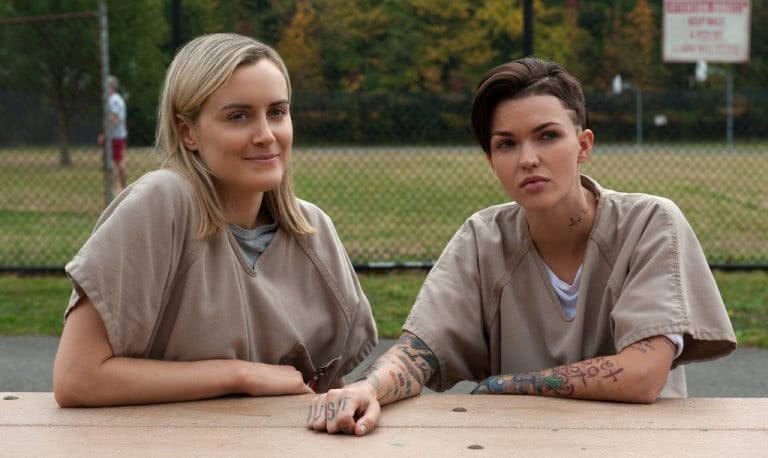This year, the US media monitoring group GLAAD announced it would no longer conduct its survey into representations of LGBT people in television, stating that (numerical) representation of queers in the media had improved substantially so as to render such a survey no longer necessary.
Without making too general a statement, every lesbian I know has seen The L Word. We all watched it as we were coming out – it was the show that helped us develop in our formative lesbian years, much like Play School or Sesame Street helped us develop in our formative human years. If Sesame Street taught us the alphabet, The L Word taught us about the alphabet soup (pardon the pretty terrible pun).
But by most accounts, The L Word is terrible. The theme song is literally the worst thing I’ve ever heard, everyone fawns over Shane as though she’s the best thing ever (she’s just not, that hair is awful), and on a serious note, the way the characters treat Max is pretty godawful and reeks of radical feminism (i.e. transphobia).
The L Word was a product of its time, but it still remains formative television viewing for young lesbians. We’ve obviously come a long way since the early 2000s – far enough for GLAAD to deem its survey unnecessary – but what show are teenage lesbians going to watch when everyone else is watching Gossip Girl?
Probably the most obvious answer is Pretty Little Liars, which is aesthetically pretty similar to Gossip Girl (that is, teenage girls with a long-haired star). GLAAD notes it has a “multiracial lesbian teen” as one of its co-leads.
Other options include Orange Is The New Black, which has some pretty smoking lesbian characters. I’m slightly hesitant to totally promote this as an option, though, because despite the fact the lesbians are babin’, multi-dimensional characters, they’re all in prison, and do we really want to further the idea that a lesbian’s place is in the cell? (Though I’d probably traffic drugs for Alex Vause too, Piper.)
There’s Faking It, the show about two girls who appear to be lesbians but are, surprise surprise, faking it. Until it turns out that one is actually gay and in love with her best friend, and therefore not actually faking it. This show kicked me right in the gut at first (what lesbian hasn’t been in love with her best friend at some stage in her life?) but it’s now halfway through season two and just decidedly terrible. The main male characters get way too much airtime for the show to attract a solid lesbian base.
Glee fulfils a similar role here, with the storyline between Santana and Brittany. But it also has the same shortcomings, with Santana and Brittany just being one subplot in a larger narrative arc about a range of other issues.
I loved The L Word when I was coming out. But it wasn’t because of any sexual desire for the characters, or even a desire to see lesbian sexual relationships displayed onscreen. What I craved most, and what satisfied me most about The L Word, was the way it displayed queer friendships. When I was coming out, I wasn’t always on the hunt for someone to fuck – I was mostly just desperate for someone to talk to. Someone like me, who understood what was happening to me, who had shared experiences, who was part of my community.
Arguably, we crave the experience of community, of mutual understandings and subcultural bonds, far more than we crave sexual or romantic partners. And this is what LGBT representation in television should be seeking to recreate. The shows I’ve mentioned have lesbians in them, and some lesbian relationships, but what they lack substantially (particularly compared to The L Word) is representation of lesbian friendships.
The LGBT identity is way more than who you sleep with or who you desire. It’s your community. And television shows need to reflect the whole LGBT identity before they can be said to be representative of LGBT people.
(I’ve used LGBT in this article to be consistent with GLAAD, however by and large I’ve spoken only about lesbian representation, in line with my own experiences. There are huge issues particularly with transgender representation on television that I don’t have the space to go into – maybe next week.)
This Week…
Happy long weekend!Get an early start and a laugh with The Shift Bar’s new weekly comedy night on Thursday October 1 – the Bizarre Comedy Vaudeville Extravaganza hosted by Brenda Trolloppe.
This Sunday October 4 sees the queer community divided once more. Over at Manning Bar, Girlthing, Homosocial and House Of Mince are teaming up to bring you Werk, a daytime party featuring the likes of DJ Kiti [below], Black Vanilla, Matt Vaughan, Cunningpants and more. Then at St George Sailing Club, Bad Dog is back with Illumiedoggie, featuring regulars Ben Drayton and Annabelle Gaspar.
On Tuesday October 6, the Sexual Violence Won’t Be Silenced campaign is running a panel discussion about online threats and harassment at The Red Rattler. Speaking on the panel will be hip hop artist Sarah Connor, journalist Lucia Osborne-Crowley and Dr. Emma Jane.


































